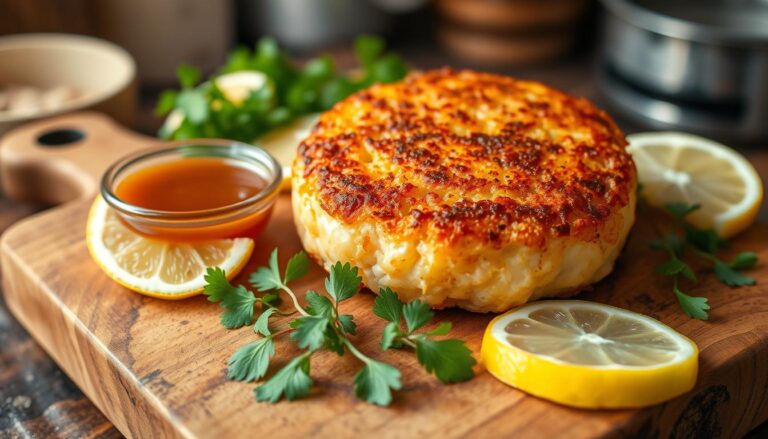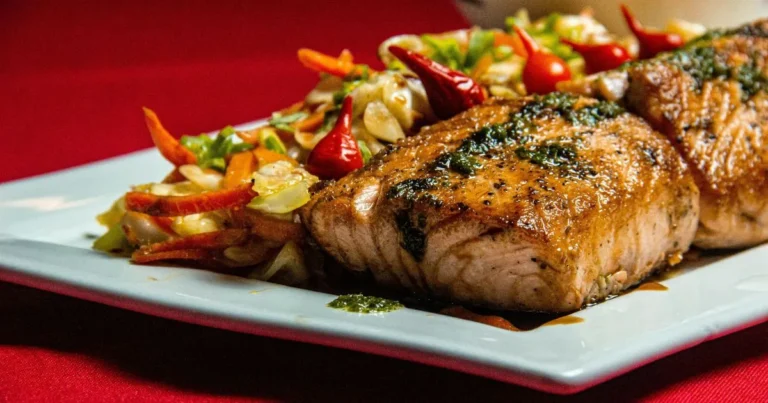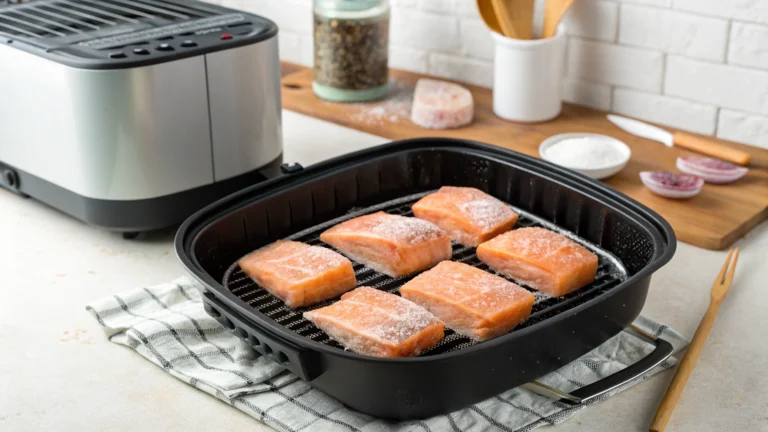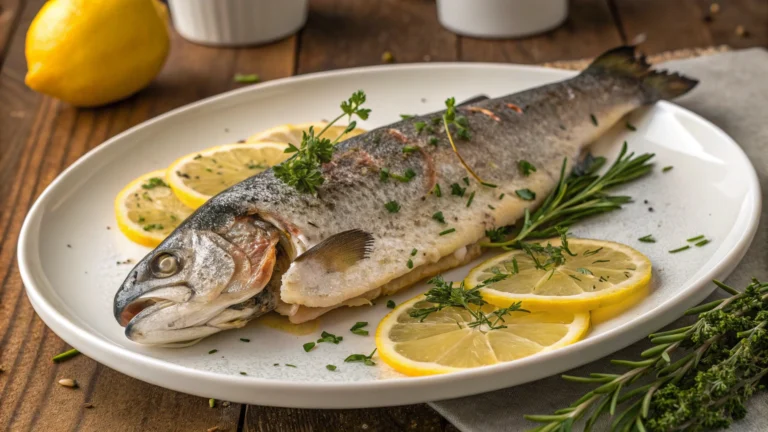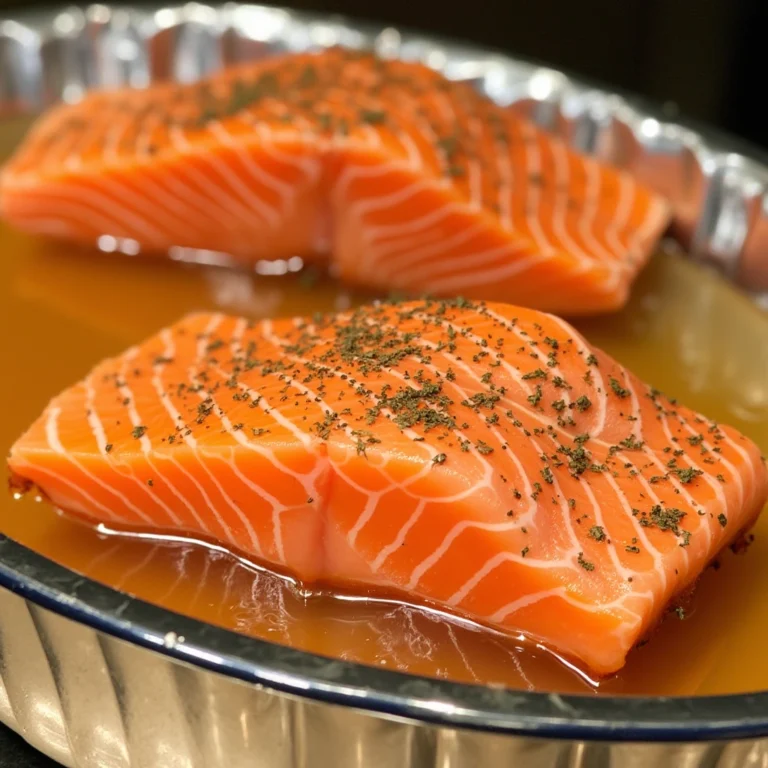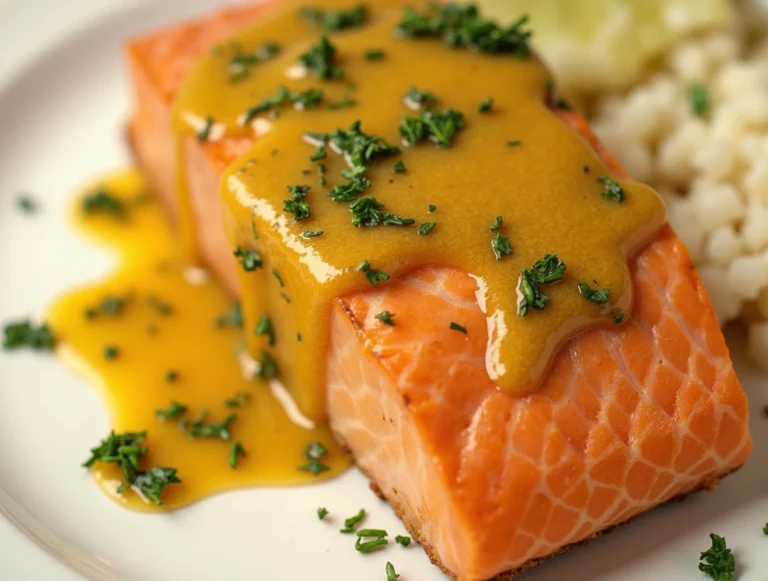Salmon Rice Bowl: 5 Steps to a Flavorful, Balanced Meal for Any Day of the Week
Salmon rice bowls are perfect for a quick, tasty, and healthy meal. They mix cooked salmon with fluffy rice, fresh veggies, and colorful sauces. This makes a balanced and fulfilling dish. They’re great for a simple dinner or a protein-packed lunch.
This dish is easy and flexible. With a few key ingredients and some prep, you can make a salmon rice bowl that looks good and is full of nutrients. Salmon, rice, and veggies together make a meal that keeps you full and energized all day.
In this guide, we’ll show you how to make a tasty salmon rice bowl for any day. We’ll cover picking the right salmon and layering your bowl. You’ll learn all the tips and tricks to make a dish that’s both yummy and healthy.
Table of Contents
What is a Salmon Rice Bowl?
Salmon rice bowls mix fresh salmon with rice for a tasty meal. They’re popular for their healthy mix of flavors and vibrant look. You can choose from many ingredients to make it your own.
The Origins of the Dish
These bowls come from Asia, where rice and seafood are key. They’ve grown to include Western tastes and local flavors. Now, they’re loved worldwide for their unique taste.
Popular Variations Around the World
- Teriyaki Salmon Bowls: A Japanese version with sweet teriyaki sauce on rice.
- Poke-Inspired Bowls: Raw salmon marinated in soy sauce and sesame oil, served over rice.
- Mediterranean-Style Bowls: Salmon with lemon, herbs, and olive oil, on couscous or quinoa.
Salmon rice bowls are great all year. They’re full of healthy salmon, grains, and tasty toppings. They’re a favorite for those who want a balanced, tasty meal.
Health Benefits of Salmon
Salmon is a superfood that’s full of health benefits. It’s rich in omega-3 fatty acids, high-quality protein, and lots of vitamins and minerals.
Omega-3 Fatty Acids Explained
Omega-3 fatty acids are key for heart and brain health. Salmon is a top source of these healthy fats, with lots of EPA and DHA. Eating salmon often can lower inflammation, reduce triglycerides, and improve cholesterol. This helps keep your heart healthy.
Nutritional Value of Salmon
A 3-ounce serving of salmon contains approximately 17 grams of protein, making it an excellent choice for muscle building and repair. Salmon also has vitamins D, B vitamins, and selenium. These nutrients are good for bones, energy, and fighting off free radicals.
| Nutrient | Amount in 3 oz Salmon |
|---|---|
| Protein | 17 grams |
| Omega-3 Fatty Acids | 1.9 grams |
| Vitamin D | 447 IU |
| Selenium | 40 mcg |
Eating salmon regularly can make your diet more balanced. It’s good for your health because of its rich nutrients and benefits.
Choosing the Right Salmon
When making a salmon rice bowl, picking the right salmon is key. Wild-caught and farmed salmon have their own perks. Knowing the differences helps you pick the best for your taste and needs.
Wild-Caught vs. Farmed Salmon
Wild-caught salmon tastes bold and has more omega-3s. It eats naturally and tastes richer. Farmed salmon is cheaper and easier to find, perfect for many.
For eco-friendly choices, look for MSC or ASC labels. These show the salmon was caught or farmed responsibly. This means the environment and sea life were protected.
| Characteristic | Wild-Caught Salmon | Farmed Salmon |
|---|---|---|
| Flavor | Robust and intense | Mild and delicate |
| Omega-3 Content | Higher | Lower |
| Availability | Limited | Abundant |
| Cost | Higher | Lower |
| Sustainability | Depends on fishing practices | Depends on farming practices |
Choosing between wild-caught and farmed salmon depends on what you like, your budget, and if you care about the planet. No matter your choice, pick quality salmon for a tasty and healthy rice bowl.
Essential Ingredients for Your Rice Bowl
Making a tasty salmon rice bowl begins with picking the right ingredients. You need protein-rich salmon and a variety of fresh veggies. Every component plays a crucial role in creating a balanced and flavorful meal. Let’s look at what makes this dish special.
Types of Rice to Use
The base of your rice bowl is the rice. You can choose from sushi rice or try other types like:
- Brown rice offers a nutty flavor and a pleasantly chewy texture.
- Jasmine rice: It’s known for its sweet smell and soft grains.
- Quinoa: A protein-rich option that’s fluffy and unique.
The rice you pick can change the taste and health benefits of your salmon rice bowl.
Fresh Vegetables and Toppings
To make a balanced and pretty rice bowl, add different veggies and toppings. Some favorites are:
- Avocado: It’s creamy and full of healthy fats.
- Cucumber: It’s refreshing and crunchy, adding contrast.
- Edamame: It’s protein-rich and full of fiber.
- Carrots: They’re colorful and full of vitamins.
- Pickled vegetables: They add a tangy flavor.
- Seaweed: It brings umami and extra nutrients.
- Sesame seeds: They add crunch and look good.
- Fresh herbs, such as cilantro or green onions, add a touch of freshness.
These ingredients make your rice bowl not just tasty but also healthy.
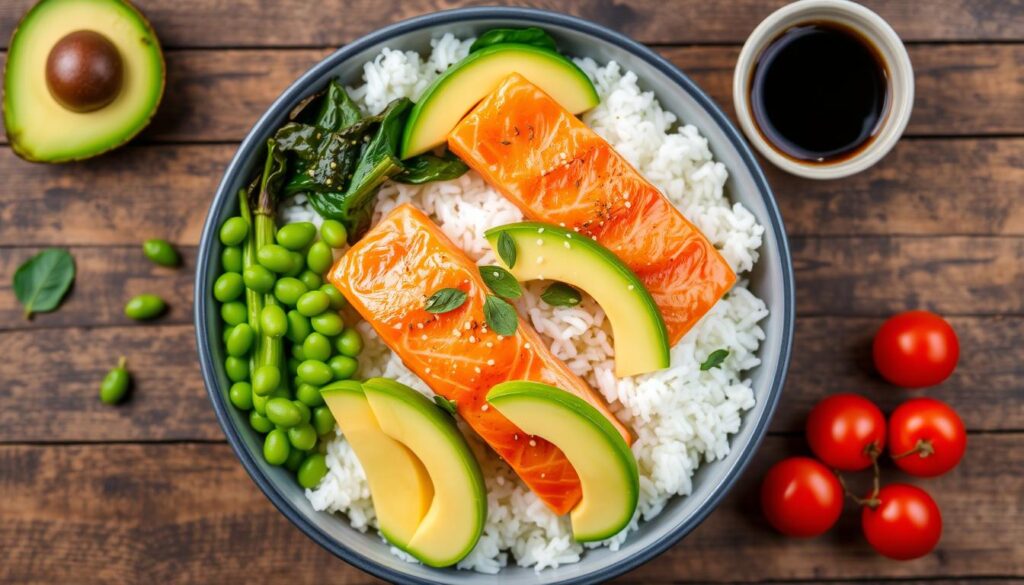
| Ingredient | Quantity |
|---|---|
| Salmon fillet | 1 lb |
| White rice | 1 cup |
| Snap peas | 8 ounces |
| Shredded cabbage | 2 cups |
| Shredded carrots | 1 cup |
Preparing the Salmon Perfectly
Salmon is the main attraction in this rice bowl, so cooking it right is key. You can grill, bake, or pan-sear the salmon for different tastes and textures. Each method adds its own twist to your easy meal.
Cooking Methods: Grilling, Baking, and More
Grilling the salmon over medium-high heat gives it a smoky taste.It develops a delightful char on the outside while remaining moist on the inside. Baking at 445°F (230°C) for 12-15 minutes makes the top crisp and the inside juicy. Pan-searing with oil creates a seared crust. Air frying is quick and keeps the salmon protein-rich and flavorful.
Tips for Seasoning
Seasoning is crucial, no matter how you cook the salmon. Salt, black pepper, and lemon juice are a classic mix. They let the salmon’s natural flavors stand out. For more flavor, marinate it in soy sauce, honey, white miso paste, and olive oil. This keeps the fish moist and adds depth.
Make sure the salmon reaches 145°F (63°C) for safety. Yet, it should still be moist and flavorful. With the right cooking and seasoning, you’ll make a protein-rich and easy meal everyone will love.
Crafting the Perfect Rice Base
A nutritious salmon rice bowl starts with the rice. To make a flavorful and fluffy base, focus on cooking techniques and enhancements. The right approach makes your rice a key part of a versatile ingredient and flavorful dish.
Cooking Rice: Techniques for Fluffy Grains
The secret to perfect rice is the right ratio of rice to water and cooking time. Rinse 1 cup of Japonica rice from Chico Rice, then simmer it in 1.5 cups of water for 20 minutes. After, let it stand covered for 5 more minutes.This guarantees that each grain turns out tender and fluffy.
Enhancing Flavor in Your Rice
- Cook the rice in low-sodium chicken or vegetable broth for more flavor.
- Add rice vinegar, soy sauce, and a bit of sugar or honey for a sushi-like taste.
- Infuse the rice with ginger, lemongrass, or garlic for a richer flavor.
- Let the rice cool slightly before adding the nutritious lunch to avoid overcooking.
With a few simple techniques, you can turn plain white rice into a flavorful base. This ensures each bite of your salmon rice bowl is a delightful mix of versatile ingredients and flavorful dish.
Adding Flavor with Sauces
Sauces can turn a simple salmon rice bowl into a delicious dish. From spicy mayo to tangy teriyaki, the right sauce can make your meal better. Try different sauces to make a balanced and tasty bowl with flavorful, easy, and versatile ingredients.
Popular Sauces to Use
- Spicy Mayo: A creamy, slightly spicy sauce that goes well with salmon.
- Teriyaki Sauce: A classic Japanese sauce that adds a sweet and savory taste to your bowl.
- Ponzu: A citrusy, umami-rich sauce that makes your dish brighter.
- Soy-Based Dressings: Made with soy sauce, rice vinegar, and sesame oil, these are great for your easy meal.
Homemade Sauce Recipes
Making your own sauces lets you choose the flavors you like. Try this quick Tamari Sesame Sauce:
“In a small bowl, mix ⅓ cup of tamari or soy sauce, 2 tablespoons of maple syrup, 1 tablespoon of toasted sesame oil, 1 teaspoon of grated ginger, 1 teaspoon of sriracha, and 1 teaspoon of sesame seeds until well combined.”
Drizzle this savory-sweet sauce over your flavorful salmon rice bowl just before serving. With the right versatile ingredients, you can try many different combinations.
Layering Your Bowl Thoughtfully
Making a tasty salmon rice bowl is more than picking the right ingredients. It’s also about how you put them together. The look and feel of your meal can be improved by layering the ingredients carefully.
Arranging Ingredients for Visual Appeal
Begin with a base of fluffy, fragrant rice. Place the tender salmon fillets on top, letting their bright color stand out. Next, add fresh, crisp veggies around the salmon for a striking contrast. Use different colors, textures, and shapes to make your bowl look great.
Balancing Flavors and Textures
A good salmon rice bowl has a mix of tastes and textures. Add sweet, salty, tangy, and umami flavors for a flavorful dish. Pair the soft salmon with crunchy veggies like julienned carrots or sliced cucumbers for a nice contrast.
By carefully arranging your ingredients and balancing flavors and textures, you can make your salmon rice bowl a nutritious lunch that looks and tastes amazing. The thoughtful layering of your versatile ingredients will create a well-rounded and flavorful dish that impresses everyone.
Meal Prep Tips for Salmon Rice Bowls
Salmon rice bowls are a great choice for meal prep. They are easy to prepare and packed with protein-rich goodness. Here are a few tips to simplify your meal prep:
Making It Ahead of Time
Cooking parts of your meal ahead of time is key. Cook rice and salmon in big batches. Then, chop your veggies early. This way, you can quickly put together your bowls when you’re ready to eat.
Storing and Reheating Guidelines
Stored right, your meal prep can last 3-4 days in the fridge. When reheating, use gentle heat to keep the salmon and rice moist. Leftovers are good for up to three days, and prep takes about 50 minutes for two servings.
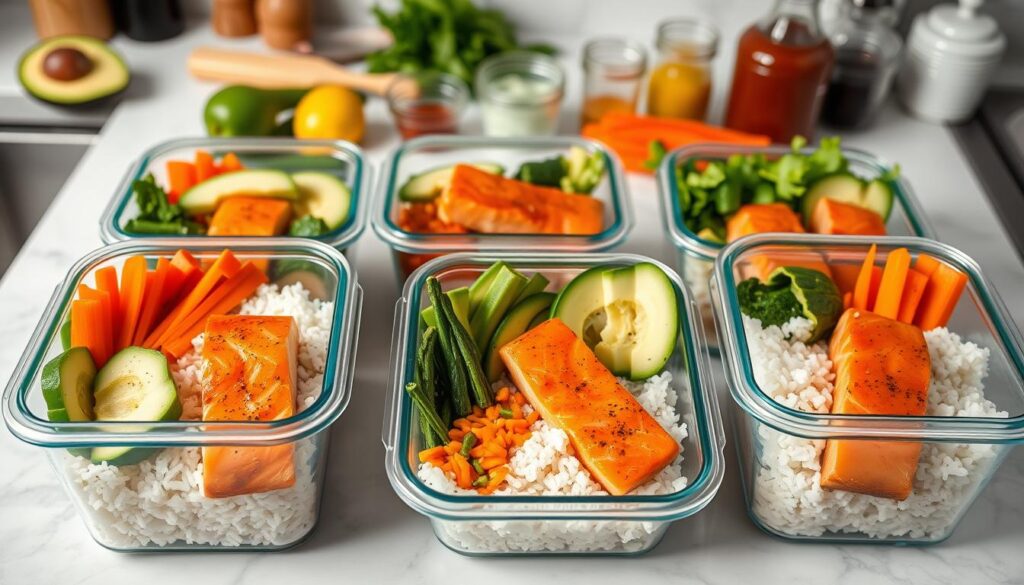
Follow these tips for a tasty, protein-rich salmon rice bowl any day. Meal prep saves time and lets you enjoy a healthy, balanced meal with ease.
Customizing Your Bowl to Taste
The salmon rice bowl is incredibly versatile. It can be made for anyone, whether you’re vegetarian, vegan, or have special dietary needs. Just by changing a few ingredients, you can make this healthy lunch your own.
Vegetarian and Vegan Alternatives
Vegetarians and vegans can swap salmon for tofu, tempeh, or plant-based seafood. These options keep the meal nutritious and flavorful. They add a protein boost without changing the dish’s taste.
Adjusting for Dietary Restrictions
For gluten-free diets, opt for tamari as a substitute for soy sauce. To make it low-carb, try cauliflower rice or mixed greens. These changes make the meal easy to fit your dietary needs.
No matter your dietary preferences, the salmon rice bowl can be customized to suit your taste. Experiment with different ingredients to discover your perfect combination of flavors and textures, making the dish uniquely yours.
“The beauty of a salmon rice bowl lies in its versatility, easily adaptable to meet any dietary preference or restriction. With just a few simple swaps, this nutritious and flavorful dish can become a go-to meal for everyone, regardless of dietary needs.”
Creative Presentation Ideas for Serving
Making your salmon rice bowls look good can make eating them even better. Traditional bowls are great for keeping everything together. But plates let you arrange your food in a more creative way.
Use dishes that match the colors of your salmon, veggies, and toppings. Add garnishes like microgreens, sesame seeds, or flowers for a fancy touch. Serving each part separately lets your guests make their own bowls, making it fun and interactive.
With a little creativity, your salmon rice bowls can become a feast for the eyes and taste buds. It’s a simple way to make your meal more special and enjoyable.

